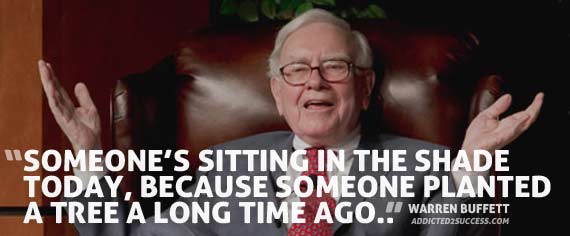Success Advice
7 Secrets Behind Warren Buffett’s Billions
Warren Buffett is incredibly successful, and he’s built a mountain of wealth.
Today, he’s the second richest person in the world, worth an estimated 73 billion dollars. That’s greater than the combined GDP of many countries.
Want to grab lunch with the man? That’ll run you $2.2 million, based on a 2014 bid by a man in Singapore.
Even more mindboggling, if you had invested just $100 in Warren Buffet’s Berkshire Hathaway fund in 1965, you’d now have more than $1.2 million stored away, off that tiny investment.
With a track record in wealth creation like this, Buffett’s life undoubtedly has lessons that we can all apply to amplify our own riches.
Below, we’ll uncover 7 secrets behind Buffett’s multi-billion-dollar wealth engine.
These are the exact strategies and techniques Buffett uses.
So pay attention.
No matter where you are on the investing spectrum, you can implement these wealth-building techniques and begin reaping the rewards in your business and life today.
The 7 Secrets Behind Buffett’s Billions:
1. He reads a lot
Buffett believes reading works a lot like compound interest. You build your knowledge base, day-by-day, by adding more information. And over time, that compounds upon itself. Until one day, you’re surrounded in a wealth of ideas, strategies and concepts.
Buffett consumes an average of 500-600 pages per day (that’s a really dense book!), and he credits reading for his ability to make smart investment decisions.
But for Buffett, it’s not about the number of pages he ingests. Rather, Buffett knows you must apply critical thinking and deep analysis to the materials you study.
That’s how you take your knowledge and money game to a whole new level, and you reap the dividends from this intellectual investment for years to come.
2. He’s methodical in his approach
Impulse decisions often fail, especially with investments. But Buffett spends hours every day researching, writing, and exploring new economic theses. So when it’s time to make a rapid-fire conclusion, he’s already prepared.
In business and investing, it’s important to hustle and capitalize on opportunities. But Buffett’s method teaches us that we should strategically hustle.
That way we’re not scrambling and taking un-calculated risks out of desperation.
3. He’s not an overnight success
Buffett’s billions are the product of years of hard work and mountains of effort. In fact, many people don’t know this, but Buffett started investing when he was just 11 years-old. Talk about taking advantage of investing early!
Also, Buffett’s first business was earning fees off pinball machines that he placed in local businesses as a teenager.
Many like to imagine Buffett’s business acumen and stock-picking talent to be magical in some way.
The reality is he’s worked incredibly hard, over many years, to earn every penny he’s worth. All 73 billion of them.

4. He relies on the numbers
Everybody has an opinion and a reason for telling stories a certain way. But rather than sifting through other people’s ideas, Buffett turns to the hard data and facts.
When he does this, he’s able to make smarter decisions, more consistently. Looking at the numbers also gives Buffett an advantage. He’s able to test new investments ideas, before anyone else comes to the same conclusions.
His actions are not clouded by the biases of others, and relying raw numbers continues to provide him with ridiculous returns.
5. He’s a master of influence
Warren Buffett said that the single most valuable skill in his life is the ability to influence and persuade people. When he first started out as an investor, he was such an awful speaker and persuader that he took a Dale Carnegie course to learn how to communicate with people. It changed his life.
Without influence, Buffett wouldn’t be able takeover companies, to buy investors out, to convince people to work for free, or to negotiate multi-billion-dollar deals. Learning this skill of communication was so impactful that, today, the only diploma he has on his office wall at Berkshire Hathaway is the one from the Dale Carnegie course. It’s one of his proudest achievements.
6. He’s persistent
In the face of fear and uncertainty, Buffett has taken enormous financial risks to buy stocks, invest in foreign countries and bailout companies on the brink of bankruptcy.
Many investors lose belief and get nervous when times are tough.
But Buffett won’t give up; he won’t take no for an answer. He keeps pushing himself and his investments to grow faster, to be more, and to outpace everyone else.
Buffett knows that the best investments come from taking calculated risks over long time horizons. He’s not in investing to make a quick buck, here and there, by trading in and out of stocks.
He’s in it for the long-haul, and his patience continues to pay off for him. Among investing legends, he has the longest track record of beating the market average. No one else is even close.
7. He lives below his means and invests
This one almost goes without say, but it’s a really important point. Without cutting expenses and saving his money, Buffett wouldn’t have the opportunity to beat the market through the years and earn billions of dollars.
After decades of living this way, Buffett never has to worry about money again. In fact, he’d have to spend nearly 200 million dollars per day to lose his net worth in a year. That’s like buying a mansion in the Hamptons and a private jet for 365 days straight, before losing it all!
Needless to say, he’s set for the rest of his life. This is the foundation for Buffett’s long-term success, and for anyone aspiring to establish wealth, this should be an essential part of their financial plan.
What do you think? This is what I found in my research. But is there anything I missed that you see the wealthiest people doing? Feel free to let me know in the comments section.
Business
Why Smart Entrepreneurs Are Quietly Buying Gold and Silver
When stocks, property, and cash move together, smart business owners turn to one asset that plays by different rules.

You’ve built your business from the ground up. You know what it takes to create value, manage risk, and grow wealth. But here’s something that might surprise you: some of the most successful entrepreneurs are quietly adding physical gold and silver to their portfolios. (more…)
Business
The Simple Security Stack Every Online Business Needs
Most small businesses are exposed online without realising it. This simple protection stack keeps costs low and risks lower.

Running a business online brings speed and reach, but it also brings risk. Data moves fast. Payments travel across borders. Teams log in from homes, cafés, and airports. (more…)
Business
If Your Business Internet Keeps Letting You Down, Read This
From smoother operations to better security, dedicated internet access is quietly powering today’s high-performing businesses.

Today, a dependable internet service is the bedrock for uninterrupted business operations. Many organizations rely on stable online connections for communication, data transfer, and customer interaction. (more…)
Did You Know
How Skilled Migrants Are Building Successful Careers After Moving Countries
Behind every successful skilled migrant career is a mix of resilience, strategy, and navigating systems built for locals.

Moving to a new country for work is exciting, but it can also be unnerving. Skilled migrants leave behind familiar systems, networks, and support to pursue better job opportunities and a better future for their families. (more…)
-

 News3 weeks ago
News3 weeks agoBrandon Willington Builds 7-Figure Business by Ignoring Almost Everything
-

 Health & Fitness3 weeks ago
Health & Fitness3 weeks agoWhat Minimalism Actually Means for Your Wellness Choices
-

 Did You Know3 weeks ago
Did You Know3 weeks agoWhy Most Online Courses Fail and How to Fix Them
-

 Business3 weeks ago
Business3 weeks agoIf Your Business Internet Keeps Letting You Down, Read This
-

 Business2 weeks ago
Business2 weeks agoEntrepreneur’s Guide to Pay Stubs: Why Freelancers and Small Business Owners Need a Smart Generator
-

 Business1 week ago
Business1 week agoThe Salary Shift Giving UK Employers An Unexpected Edge
-

 Business1 week ago
Business1 week agoThe Simple Security Stack Every Online Business Needs
-

 Scale Your Business1 week ago
Scale Your Business1 week ago5 Real Ways to Grow Your User Base Fast





























4 Comments